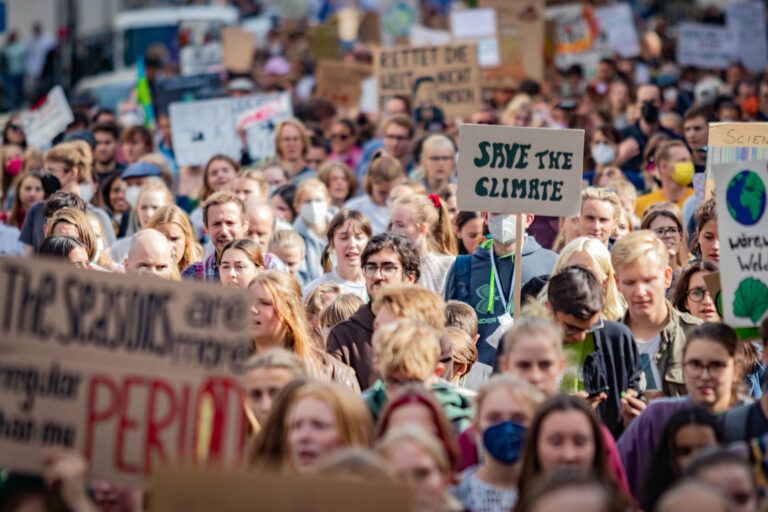Photo credit: Fridays4Future.
(London, September 28, 2024) – The United Kingdom should end the use of disproportionate sentences against climate protesters, including those engaged in non-violent civil disobedience, said Climate Rights International in response to the sentencing of two protesters who threw soup at a Van Gogh painting.
On September 27, Phoebe Plummer, 23, was sentenced to two years in prison for “criminal damage.” Her co-defendant, Anna Holland, 22, received 20 months for the same offence, but will serve only half in custody. The two threw two cans of tomato soup at Van Gogh’s painting “Sunflowers” in London’s National Gallery of Art in October 2022. The National Gallery confirmed that the painting, which is covered in protective glass, was not damaged, but said that the soup caused £10,000 of damage to the frame of the painting.
“Lengthy prison sentences are a disproportionate and draconian response to non-violent civil disobedience,” said Linda Lakhdhir, Legal Director at Climate Rights International. “Instead of jailing those trying to draw attention to the climate crisis, the UK government should be taking urgent action to tackle that climate change.”
The sentence was just the latest in a string of lengthy prison sentences imposed on climate protesters in the United Kingdom. Morgan Trowland and Marcus Decker were sentenced to multi-year prison sentences in April 2023 for climbing the cables of the Queen Elizabeth II bridge to object to new oil, gas and coal projects. The three-year sentence imposed on Trowland was, at the time, the longest ever for a climate protest in the UK. It has since been surpassed. In July, Roger Hallam was sentenced to five years in prison for “conspiring to cause a public nuisance” after participating in a zoom call about a protest on the M25. Four others who participated in that call and the planned protest to various degrees each received four years in prison.
While those who engage in peaceful civil disobedience, which involves deliberate law breaking, can face sanctions, any punishments should be proportionate and should not be designed to deter others, said Climate Rights International.
These sentences are part of a larger trend of repression of climate protesters in western democracies, as documented in our recent report, On Thin Ice: Disproportionate Responses to Climate Change Protesters in Democratic Countries. Peaceful climate protesters in the Netherlands have been targeted with water cannons. In the German state of Bavaria, members of climate group Last Generation have been held in preventative detention, had their homes raided, and been accused of forming a “criminal organization.” In the United States, climate activist Tim Martin is facing up to five years in prison for smearing washable paint on the protective case of Degas’ statue “Tiny Dancer.”
Countries have also enacted new laws specifically targeted at climate protesters, including “critical infrastructure” laws that criminalize protests near oil facilities or on roads and bridges. Steve Gingell was sentenced, in December 2023, to six months in prison for slow marching for half an hour on a road in north London under a critical infrastructure provision enacted in 2023. Deanna “Violet” Coco was sentenced to 15 months in prison in Australia under a similar law for blocking one lane of the Sydney Harbor Bridge for 30 minutes, though the prison sentence was later quashed by a higher court.
“Whether or not you agree with the tactics being used by climate activists, the right to peaceful protest – including peaceful civil disobedience – is a foundational right in a democracy that should be protected,” said Lakhdhir. “The UK government should end the use of harsh rhetoric and disproportionate sentences against climate protesters and respect the fundamental right to protest.”







